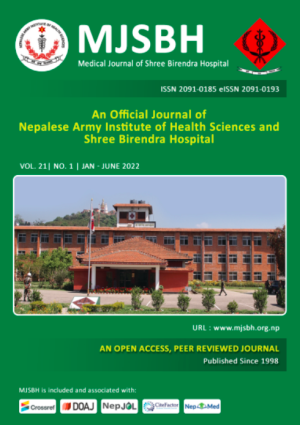COVID-19 Preparedness and Response Hands-on Training to Healthcare Workers at Shree Birendra Hospital, Nepal
DOI:
https://doi.org/10.3126/mjsbh.v21i1.39714Keywords:
COVID-19, preparedness and response, infection prevention and control, pre-test, healthcare workersAbstract
Introduction: COVID-19 pandemic in many countries of the world, including Nepal, is requiring a level of response which is beyond the capacity of the nation. It needs collaborative action to increase the capacity to respond to outbreaks. With the aim of providing and assessing the effectiveness of hands-on training, healthcare professionals from Nepalese Army Institute of Health Sciences (NAIHS) and Shree Birendra Hospital (SBH) started COVID-19 Preparedness and Response Hands-on training to frontline workers from April to December 2020.
Methods: The training was initiated with the formation of core group of trainers, who conducted training of trainers (TOT) for 31 healthcare workers. The trainers who received TOT further trained 2549 healthcare workers from different health institutions. The training included topics like COVID-19 introduction and case definition; hand hygiene, respiratory hygiene and physical distancing; donning and doffing; disinfection and waste management; sample collection; patient transfer; dead body management and stress coping. Pre-test and post-test was done on 821 training participants to assess the effectiveness of training by using semi-structured self-administered questionnaire. From among 821 trainees involved in pre and post-test, 266 participants were randomly selected for data analysis from the training register. Data were analyzed by using Microsoft Excel and described by using descriptive and inferential statistics.
Results: In our study, a score of ≥80% was acquired by 25.2% participants in pre-test and 76.3% participants in post-test. There was a significant increase in participants’ scores in post-test as compared to pre-test scores (p-value <0.001).
Conclusions: On-site hands-on training is effective in acquisition of knowledge on key areas of COVID-19 preparedness and response.
Downloads
111
133
Downloads
Published
How to Cite
Issue
Section
License
Copyright (c) 2022 Medical Journal of Shree Birendra Hospital

This work is licensed under a Creative Commons Attribution-NonCommercial-NoDerivatives 4.0 International License.




